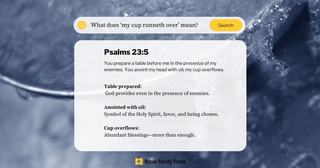
Change Translation
- Recent Translations
- All Translations
Images for Psalm 23:6


Share

Share

Share

Share
Related Articles
Psalm 23:6 in Other Translations
Psalm 23:6 Meaning and Commentary
Surely goodness and mercy shall follow me
Either the free grace, love, favour, and mercy of God in Christ, which endures continually, and is always the same from everlasting to everlasting; or the effects of it; and these either temporal good things, which flow from the goodness and mercy of God, and not the merits of men; and which are in great mercy and loving kindness bestowed on his people, and which follow them: they do not anxiously seek after them; but seeking the kingdom of God and his righteousness, these are added to them, they trusting in the Lord, and he caring for them: or spiritual good things, which arise from the mere grace and mercy of God; such as the blessings of the covenant, the sure mercies of David, the discoveries and instances of the love of God, and the provisions of his house, which follow them, being undeserving of them; and even when they have backslidden from the Lord, and in times of distress, when his grace is sufficient for them; and of all this the psalmist had a comfortable assurance, depending upon the promise of God, arguing from the blessings he had already bestowed, and from the constant care he takes of his people, having in view his unchangeableness and faithfulness, the firmness of his covenant, and the irreversibleness of the blessings of it: the words may be rendered "only goodness and mercy" F3 nothing but mere mercy and kindness; for though afflictions do attend the children of God, yet these are in mercy and love; there is no fury in the Lord against them; there is nothing comes in wrath to them, throughout the whole course of their lives; wherefore it is added,
all the days of my life;
the mercies of God are new every morning, they continue all the day long; temporal goodness abides as long as life lasts, and ends with it; and spiritual blessings are for ever, they are the gifts of God, which are without repentance;
and I will dwell in the house of the Lord for ever;
which may denote his constant attendance on the public worship of God, of which he had been deprived in time past, being driven out from it, but now he enjoyed it, and believed he ever should; or it may design his being a member of the church of God, and a pillar in the house and temple of the Lord, that should never go out; see ( Revelation 3:12 ) ; or it may regard the assurance he had of dwelling in the house not made with hands, eternal, in the heavens, Christ's Father's house, in which are many mansions, sure dwellings, and quiet resting places for his people, and that to all eternity. The Targum interprets it of the house of the sanctuary; and Kimchi expounds the whole verse in a petitionary way, "may goodness and mercy"
F3 (Ka) "nil nisi", Junius & Tremellius; "certe vel tantum", Cocceius.
Psalm 23:6 In-Context
Cross References 1
-
1.
S
Nehemiah 9:25
Study Tools
PLUSUnlock Notes
This feature is for PLUS subscribers only. Join PLUS today to access these tools and more.
JOIN PLUSUnlock Highlights
This feature is for PLUS subscribers only. Join PLUS today to access these tools and more.
JOIN PLUSUnlock Bookmarks
This feature is for PLUS subscribers only. Join PLUS today to access these tools and more.
JOIN PLUSTrack Your Reading
Create a free account to start a reading plan, or join PLUS to unlock our full suite of premium study tools.
